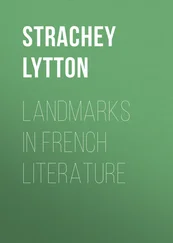Lytton Strachey - Books and Characters, French & English
Здесь есть возможность читать онлайн «Lytton Strachey - Books and Characters, French & English» — ознакомительный отрывок электронной книги совершенно бесплатно, а после прочтения отрывка купить полную версию. В некоторых случаях можно слушать аудио, скачать через торрент в формате fb2 и присутствует краткое содержание. Жанр: Биографии и Мемуары, Языкознание, foreign_antique, на английском языке. Описание произведения, (предисловие) а так же отзывы посетителей доступны на портале библиотеки ЛибКат.
- Название:Books and Characters, French & English
- Автор:
- Жанр:
- Год:неизвестен
- ISBN:нет данных
- Рейтинг книги:3 / 5. Голосов: 1
-
Избранное:Добавить в избранное
- Отзывы:
-
Ваша оценка:
- 60
- 1
- 2
- 3
- 4
- 5
Books and Characters, French & English: краткое содержание, описание и аннотация
Предлагаем к чтению аннотацию, описание, краткое содержание или предисловие (зависит от того, что написал сам автор книги «Books and Characters, French & English»). Если вы не нашли необходимую информацию о книге — напишите в комментариях, мы постараемся отыскать её.
Books and Characters, French & English — читать онлайн ознакомительный отрывок
Ниже представлен текст книги, разбитый по страницам. Система сохранения места последней прочитанной страницы, позволяет с удобством читать онлайн бесплатно книгу «Books and Characters, French & English», без необходимости каждый раз заново искать на чём Вы остановились. Поставьте закладку, и сможете в любой момент перейти на страницу, на которой закончили чтение.
Интервал:
Закладка:
Lytton Strachey
Books and Characters, French & English
The following papers are reprinted by kind permission of the Editors of the Independent Review, the New Quarterly, the Athenaeum, and the Edinburgh Review.
The 'Dialogue' is now printed for the first time, from a manuscript, apparently in the handwriting of Voltaire and belonging to his English period .
RACINE
When Ingres painted his vast 'Apotheosis of Homer,' he represented, grouped round the central throne, all the great poets of the ancient and modern worlds, with a single exception—Shakespeare. After some persuasion, he relented so far as to introduce into his picture a part of that offensive personage; and English visitors at the Louvre can now see, to their disgust or their amusement, the truncated image of rather less than half of the author of King Lear just appearing at the extreme edge of the enormous canvas. French taste, let us hope, has changed since the days of Ingres; Shakespeare would doubtless now be advanced—though perhaps chiefly from a sense of duty—to the very steps of the central throne. But if an English painter were to choose a similar subject, how would he treat the master who stands acknowledged as the most characteristic representative of the literature of France? Would Racine find a place in the picture at all? Or, if he did, would more of him be visible than the last curl of his full-bottomed wig, whisking away into the outer darkness?
There is something inexplicable about the intensity of national tastes and the violence of national differences. If, as in the good old days, I could boldly believe a Frenchman to be an inferior creature, while he, as simply, wrote me down a savage, there would be an easy end of the matter. But alas! nous avons changé tout cela . Now we are each of us obliged to recognise that the other has a full share of intelligence, ability, and taste; that the accident of our having been born on different sides of the Channel is no ground for supposing either that I am a brute or that he is a ninny. But, in that case, how does it happen that while on one side of that 'span of waters' Racine is despised and Shakespeare is worshipped, on the other, Shakespeare is tolerated and Racine is adored? The perplexing question was recently emphasised and illustrated in a singular way. Mr. John Bailey, in a volume of essays entitled 'The Claims of French Poetry,' discussed the qualities of Racine at some length, placed him, not without contumely, among the second rank of writers, and drew the conclusion that, though indeed the merits of French poetry are many and great, it is not among the pages of Racine that they are to be found. Within a few months of the appearance of Mr. Bailey's book, the distinguished French writer and brilliant critic, M. Lemaître, published a series of lectures on Racine, in which the highest note of unqualified panegyric sounded uninterruptedly from beginning to end. The contrast is remarkable, and the conflicting criticisms seem to represent, on the whole, the views of the cultivated classes in the two countries. And it is worthy of note that neither of these critics pays any heed, either explicitly or by implication, to the opinions of the other. They are totally at variance, but they argue along lines so different and so remote that they never come into collision. Mr. Bailey, with the utmost sang-froid, sweeps on one side the whole of the literary tradition of France. It is as if a French critic were to assert that Shakespeare, the Elizabethans, and the romantic poets of the nineteenth century were all negligible, and that England's really valuable contribution to the poetry of the world was to be found among the writings of Dryden and Pope. M. Lemaître, on the other hand, seems sublimely unconscious that any such views as Mr. Bailey's could possibly exist. Nothing shows more clearly Racine's supreme dominion over his countrymen than the fact that M. Lemaître never questions it for a moment, and tacitly assumes on every page of his book that his only duty is to illustrate and amplify a greatness already recognised by all. Indeed, after reading M. Lemaître's book, one begins to understand more clearly why it is that English critics find it difficult to appreciate to the full the literature of France. It is no paradox to say that that country is as insular as our own. When we find so eminent a critic as M. Lemaître observing that Racine 'a vraiment "achevé" et porté à son point suprême de perfection la tragédie , cette étonnante forme d'art, et qui est bien de chez nous: car on la trouve peu chez les Anglais,' is it surprising that we should hastily jump to the conclusion that the canons and the principles of a criticism of this kind will not repay, and perhaps do not deserve, any careful consideration? Certainly they are not calculated to spare the susceptibilities of Englishmen. And, after all, this is only natural; a French critic addresses a French audience; like a Rabbi in a synagogue, he has no need to argue and no wish to convert. Perhaps, too, whether he willed or no, he could do very little to the purpose; for the difficulties which beset an Englishman in his endeavours to appreciate a writer such as Racine are precisely of the kind which a Frenchman is least able either to dispel or even to understand. The object of this essay is, first, to face these difficulties, with the aid of Mr. Bailey's paper, which sums up in an able and interesting way the average English view of the matter; and, in the second place, to communicate to the English reader a sense of the true significance and the immense value of Racine's work. Whether the attempt succeed or fail, some important general questions of literary doctrine will have been discussed; and, in addition, at least an effort will have been made to vindicate a great reputation. For, to a lover of Racine, the fact that English critics of Mr. Bailey's calibre can write of him as they do, brings a feeling not only of entire disagreement, but of almost personal distress. Strange as it may seem to those who have been accustomed to think of that great artist merely as a type of the frigid pomposity of an antiquated age, his music, to ears that are attuned to hear it, comes fraught with a poignancy of loveliness whose peculiar quality is shared by no other poetry in the world. To have grown familiar with the voice of Racine, to have realised once and for all its intensity, its beauty, and its depth, is to have learnt a new happiness, to have discovered something exquisite and splendid, to have enlarged the glorious boundaries of art. For such benefits as these who would not be grateful? Who would not seek to make them known to others, that they too may enjoy, and render thanks?
M. Lemaître, starting out, like a native of the mountains, from a point which can only be reached by English explorers after a long journey and a severe climb, devotes by far the greater part of his book to a series of brilliant psychological studies of Racine's characters. He leaves on one side almost altogether the questions connected both with Racine's dramatic construction, and with his style; and these are the very questions by which English readers are most perplexed, and which they are most anxious to discuss. His style in particular—using the word in its widest sense—forms the subject of the principal part of Mr. Bailey's essay; it is upon this count that the real force of Mr. Bailey's impeachment depends; and, indeed, it is obvious that no poet can be admired or understood by those who quarrel with the whole fabric of his writing and condemn the very principles of his art. Before, however, discussing this, the true crux of the question, it may be well to consider briefly another matter which deserves attention, because the English reader is apt to find in it a stumbling-block at the very outset of his inquiry.
Читать дальшеИнтервал:
Закладка:
Похожие книги на «Books and Characters, French & English»
Представляем Вашему вниманию похожие книги на «Books and Characters, French & English» списком для выбора. Мы отобрали схожую по названию и смыслу литературу в надежде предоставить читателям больше вариантов отыскать новые, интересные, ещё непрочитанные произведения.
Обсуждение, отзывы о книге «Books and Characters, French & English» и просто собственные мнения читателей. Оставьте ваши комментарии, напишите, что Вы думаете о произведении, его смысле или главных героях. Укажите что конкретно понравилось, а что нет, и почему Вы так считаете.












